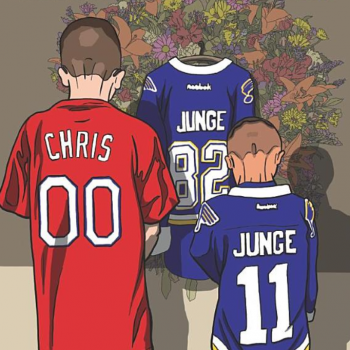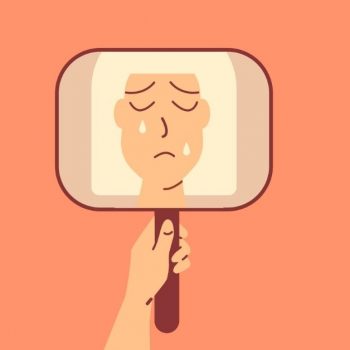What is Suffocated Grief
/ Types of Grief and Loss : Litsa
For further articles on these topics:
I had never even heard the term 'suffocated grief' the first time I witnessed it. Or perhaps I should say the first time I was consciously aware I was witnessing . . . something. Something troublesome. I was in my twenties, a social worker working with families in the hospital at the time of a family member's sudden and unexpected death. I'd been working with a family for most of the afternoon. Their father had been injured in an accident and was not going to survive. As more extended family arrived, the nurse I'd been working with for hours approached me to say she was thinking of calling security. She explained that if the family couldn't 'contain' their grief, it was too 'risky' to have them on the unit.
I was stunned and confused. We were working with the same family but experiencing them entirely differently. And don't get me wrong, this isn't some 'I was such a great social worker, she was such a bad nurse' story. This is a 'being present with human suffering is complicated' story. Where I saw pain, crisis, and grief, she saw a threat. Where I saw a need to provide space and support, she saw something requiring restriction and containment.
Some background
Nearly a decade before that moment, when I was still a teenager, my father had died in another ICU in a hospital ten miles away. The man in this ICU bed had kids, a bit younger than my sister and I were when our dad died. This family spilled out of the small ICU hospital room and tiny waiting room, as ours had. They stayed through the night, as we had some nights. They looked as lost and helpless and devastated and angry as I remember feeling.
Where my family and this family differed was in the expression of our suffering. As I watched family member after family member walk into this patient's ICU room, I could hear wailing. It was that visceral crying that comes from one's gut in grief. Extended family members would arrive and learn that there were no more treatment options. Their pain, anger, disbelief, and demands to talk to a doctor echoed from the room.
Working with that family I saw everything I’d felt in my own losses, that my family also felt. But no one ever saw that emotion in the hospital from my family. Because we'd followed the 'rules' - the unwritten grief rules that I hadn’t even been consciously aware of when my father died. I'd come to understand these rules only as I worked with other families. I learned that not everyone holds emotions in. I saw the huge range in people's personalities, cultures, communication styles, and religions. I saw the breadth of grief expressions and I saw how others responded to those expressions. It didn't take long to understand that not all suffering was treated equally, especially when it violated the rules and expectations of the healthcare team.
The Rules
My mother was in the medical field; she'd worked in a trauma center. She spoke the language of healthcare. Without conscious awareness or discussion, we followed the 'rules' of an ICU. The explicit rules – no visitors after a certain time, leave the room when the doctors and nurses ask, be quiet even when you want to scream. And we followed the unspoken rules too. We'd wait endlessly for meetings with the doctors without complaint, no matter how late they were. We kept our emotions quiet, in meetings and at the bedside, so as not to disturb anyone else. Be polite. Say thank you when the social worker offers you the 37th glass of orange juice that you don’t want. Make sure your pain doesn't cause distress for anyone around you.
We crammed our grief into the social rules and it never felt like a conscious choice. It felt excruciating, but required, part of some tacit social agreement that no matter how bad things are, you hold it in. When I started working with other families and learned it wasn't actually required, part of me envied them. I was I didn't envy their loss, of course. I envied that they were able to outwardly express their anger and despair in a way that I never could. But of course, it came at a price.
Suffocated Grief
For a long time I thought 'disenfranchised grief' defined what I was seeing in situations where medical staff imposed rules on families who were 'too much' in their pain, limiting visitors and making security calls. Ken Doka, who first defined disenfranchised grief, explicitly described one example of it as situations when society is unaccepting of the way one expresses their grief.
It wasn't until years later, sitting in a conference listening to Dr. Tashel Bordere, that I realized it was more than that.. I heard the phrase 'suffocated grief' for the first time, a term she coined. She explained that for some, their expression of grief is not simply unacknowledged or stigmatized, as in disenfranchised grief, but it is punished. As she described normal grief reactions being penalized, all those calls to security flashed in my memory. I thought of all the times that, despite my assurances that there was no threat and this was simply grief, families were punished with security and restrictions on visiting. This limited who could come to the bedside within their last days with a dying family member. These were all subtle and not-so-subtle ways of saying, your grief is not acceptable. Your grief is too much, it doesn't follow the rules. You will be penalized if you can't contain your pain.
Often these sanctions came against families whose grief seemed least understood by the healthcare team. Families whose race, religion, culture, or socioeconomic status didn't align with that of the hospital staff meant that their expressions of grief were more likely to be interpreted as threats than the expressions of families like mine, families who grief expression stayed within the confined rules of a US healthcare system.
Who bears the brunt of suffocated grief?
Unsurprisingly, suffocated grief impacts certain people more than others. Dr. Bordere's finds these disparities impact grieving children in the classroom. The natural grief response in children is not always what people expect, even teachers. It can show up many months and years after a loss, as kids process the loss as they age and their brains keep developing. Rather than sadness or tears, it can show up as kids coming to school sleepy, distracted, having difficulty regulating their emotions, showing signs of regression, or being disruptive.
These are all normal grief responses that we would want to be met with care and support from adults. But like misunderstood families in the ICU, unfortunately, in a school setting they are often misread and met with discipline. Boys exhibiting these types of behaviors are more likely to be punished than girls exhibiting the same behaviors. And lest you think this is just touchy-feely emotional stuff, the impact is tangible.
Studies have found that these differences in discipline starting as early as ages 4 and 5 reduce the likelihood of these boys graduating from high school and college as compared to girls who exhibit the exact same behaviors. Black, Latino, and lower-income children, who are more likely to experience childhood bereavement, are also more likely to be punished and to receive more severe punishments than their white, more affluent peers with the same grief reactions and behaviors. As they get older, these same kids end up more likely to experience incarceration.
It is perhaps no surprise then that when 2,400 incarcerated adults were surveyed about what they believe could have helped keep them stay out of prison, 36% said counseling, with many saying grief counseling specifically. Counseling was tied as the most common response, alongside affordable housing. It was ranked above making a livable wage, completing high school, or going to college. Though the impact of suffocated grief in children can be difficult to directly measure and it certainly doesn't lead to dropping out or incarceration for all students who experience it, many adults bereaved as children can clearly identify its' ripple effects.
Suffocated grief at work
In the US, countless jobs don't offer bereavement leave. For those who are lucky enough to have it, three days is the average allocation. Some can couple that with vacation time and sick time after a death, but many grieving have already used that time when serving as a caregiver before the death.
Returning to work just days after a death works for some people. It can be a nice distraction. But for many, the normal reactions of early grief make it nearly impossible to function at peak capacity at work. Understandably! Memory difficulties, diminished attention and focus, difficulty regulating emotion, and fatigue are expected in early grief. Layer on things like hopelessness, new logistical struggles that come with parenting alone or settling an estate, and it is no surprise employees struggle.
Implicit in these bereavement leave policies is a message from the workplace - we think after three days you should be capable of returning to work and competently doing your job. Where does that leave us when our grief doesn't allow that?
Much of what follows depends on workplace culture. Everything from company policies, the relationship one has with their boss, and how grief-literate a workplace has an impact. We've heard from countless people who experienced disciplinary action and even termination in the early weeks or months following a loss. It is a catch-22 in which limited bereavement leave policies force some people back to work well before they feel able, while then penalizing them for the impact grief has on their job.
These disciplinary actions can leave people's confidence damaged, fearing they're never going to learn to cope. More, it reinforces the idea that grief is a failure or needs to be hidden at all costs. It can create more loss, confusion, and shame - for kids and adults alike. And it can leave those most exposed to death and grief the most vulnerable.
So what do we do?
There isn't some magic answer to the problem of suffocated grief. But it can help your own understanding of your grief if you've experienced this, as a child or an adult. It may have impacted everything from the support you did (or didn't) receive, your perception of your grief reactions, and how your grief shows up now. You might benefit from support in rebuilding your self-confidence or feeling safe to express your grief to others. And sometimes it just helps to have some acknowledgment that if you experienced suffocated grief and it complicated your trajectory after loss, you're not alone and it's never too late to find support.
As a human being - be it a parent or caregiver, an employer or coworker, a teacher or school administrator, we can all be more aware of suffocated grief. Consider how a lack of understanding of grief in schools and workplaces can lead to the punishment of grief, especially for those who might be shouldering the most loss. Check-in on your grieving colleagues. Remember that students may be grieving new losses, but also might still be deeply impacted by old losses. Advocate for better bereavement leave policies. Our greatest hope to improve the culture of grief to collectively become more understanding and empathetic of the many faces and expressions of grief.
Have an experience with suffocated grief? Leave a comment.

We invite you to share your experiences, questions, and resource suggestions with the WYG community in the discussion section below.
We wrote a book!
After writing online articles for What’s Your Grief
for over a decade, we finally wrote a tangible,
real-life book!
What’s Your Grief? Lists to Help you Through Any Loss is for people experiencing any type of loss. This book discusses some of the most common grief experiences and breaks down psychological concepts to help you understand your thoughts and emotions. It also shares useful coping tools, and helps the reader reflect on their unique relationship with grief and loss.
You can find What’s Your Grief? Lists to Help you Through Any Loss wherever you buy books:





Kay Gold January 24, 2024 at 11:30 am
I’ve never heard of this kind of grief. My son was killed in an accident in 2015. He had sole custody of his son who was 9 at the time. My work provided me with the 3 day bereavment time and 2 extra days because they felt “bad”. I had 5 days to plan a funeral, get an attorney and gather documents and items to move my grandson into my home. A week after I returned to work I was told I needed to “get it together” I have no idea how I got to work, or what I was doing everything was just a fog. 3 months later my mom unexpectedly passed away. I knew they were NEVER going to tolerate another leave or death on my behalf because that would affect their “customers”. I left. I couldn’t do it. There’s 3 days bereavement time but 6 weeks or more for new mothers or adoption. Which I totally agree there should be. But to gain guardianship of a child… nothing… HR doesn’t consider that a need of leave because… it’s not written that way. A death, guardianship, a grieving 9 year old and a grieving mother. Thanks for the 5 freakin days.
I still feel like a grief cloud follows me.
Tammy January 21, 2024 at 9:49 am
Thank you for this term and its definition. It’s exactly how I’ve felt for over 55 years since losing my dad to cancer when he was 41 and I was 6. In his last week of life, he was in the hospital but they didn’t allow children to visit in patients’ rooms back then. I was an only child so my mom would have to leave me alone in the waiting room while she spent time with Dad. Then, whenever possible, she would come and sneak me into his room to visit him until a nurse or doctor forced me to leave again. I spent hours making little paper chains in the waiting area by myself…stuffing down my grief because I was alone and scared. And then the fact that no one talks about the dead afterward because they’re afraid of making you more sad. Fortunately, my mom talked about my dad with me a lot over the years but rarely did anyone else. There was no grief counseling for kids back then. I’ve never dealt with it and I’m 62 but I find weird solace in the fact that I’m aging and it won’t be another 55 years before I see my precious dad again. And now I experience anticipatory grief as I watch my 97 year old sweet mom slipping away with Alzheimer’s. Life is complicated and hard…and, yes, also amazing, but still…complicated and hard. Thank you for defining this term and giving me another word for how I’ve felt for so long. And thanks for all you do to support grieving people. It truly helps and matters. Hugs to everyone reading and posting here.
Suzanne M August 31, 2023 at 5:45 pm
I have suffocated grief of another sort. I was 30 when my dad died. Then over the years there was one family death after another including some beloved pets but I could never take time to grieve because other living family member’s needs had to come before my own. I am 77 now and my beloved little dog had to be put to rest almost 4 months ago. I’m a widow of 7 yrs; and, suddenly I realize that my grief was suffocated/stuffed down all those years. It’s difficult. On top of that I had Covid & undiagnosed Lyme Disease together last winter that caused me to be so sick myself; and, due to brain fog, I didn’t recognize how my little dog was declining and terriers are so good at hiding pain. So now I am taking time for the self-care that I never could take time for in the past. Thanks for reading and if you are a praying person please say one for me as I am praying for all on this list who have suffocated grief. None of us wants to burden others since everybody has had some significant losses since the start of 2020/Covid issues. I’m thankful for this website.
Corey S April 19, 2023 at 9:55 am
Hi. Thank you for making this website full of information.
I am a 41 yo women and I lost my father at age four to skin cancer. I thought I was fine, but when my cousin died unexpectedly last summer to a wasp sting, I fell apart. Her daughter was 3 at the time and I could not help identifying with her and thinking of my own loss. I am trying to figure out how to stop supressing my grief, but most articles talk about steps or tasks that are more applicable for new losses.
Is my loss suffocated grief? How do I allow myself to grieve when I suppress it because I am afraid of completely losing myself? I am a wife and mother and have a career, so I fear I cannot handle it all.
Thank you for reading my message.
Kelly Rice April 4, 2023 at 6:06 pm
I was 19 when I became pregnant with my first child a son. I was. Young mother I was 22 when I had my second boy. I knew there was something off with my oldest. Jump 6 years old he was getting weaker and weaker. His PCP doctor kept reassuring me he’s fine. My younger son needed to go to orthopaedics for his ankle and so I just so happened to take my oldest with me. He recognized the Gowers sign or called the gate. It’s a way for a child who has Duchenne Muscular Dystrophy gets from the floor to standing by pushing off from the thighs af standing like legs apart. The doctors diagnosed him and kept there eye on younger brother which same thing but younger brother seemed a little stronger by 9 both boys were in power wheelchairs. To what I’m getting at. I believe my grief started when oldest boy turned 6 so for 13 years my grief and the !ore sad I became if that makes sense. I stayed home to care for both boys by myself and year after year the more exhausted I became. !y oldest turned 19 he passed away his brother passed at 18 one year later. I never got any help for the grief. That was all 2014 and 2015. I struggled to find a job or used the job thing as a revolving door I don’t know what I like to do I started on that journey for a career. Now I have to care for my mom who has Dementia and Epilepsy. I m determined to get things figured out before she passes. I don’t want to stay at my brothers where mom has been. It really is stressful I feel this isolation I’ve got here In California I know no one don’t have a clue how to get around plus I’m here caring for her yes it’s dragging me back to old helpless Kelly. I had overcame but now I’m stuck. I cry out to Jesus for Him to get m out but I know being here is where I need to be. My question when she passes and she is in her last stage of Dementia will mess me up?
Thank you
Kelly Rice
Emily March 8, 2023 at 8:43 pm
Like so many others I relate to this article. My husband of 14 years died in 2018. It was unexpected and happened so quickly that I felt like the cartoons shaking their heads to be sure that they are not hallucinating(he died from Influenza A). Initially my employer seemed empathetic and flexible. I had not decided how much FMLA I was going to use, but received approval. I was a walking zombie the first few weeks struggling with sleep disturbances, hearing his voice from other rooms in our home, debilitating panic attacks, trying to adjust to parenting our boys alone, and the overall sense that I had to be going crazy because everything felt so strange. My boss began hounding me about a return date after the first week. She told me I needed my work and it would be good for me. I did love my job, but I was extremely apprehensive and anxious about going back. I did not feel ready at all. After 2 more weeks of phone calls and wanting a return date I agreed to return after only 3.5 weeks. Upon my return my anxiety increased substantially. I spent my first days there staring at the walls in my office trying to figure out what to do. I answered only 1 email and it was for a lunch invite. It took me an entire day to write the response. I felt lost, unfocused, foggy, and not in my right mind at all. My job had a high level of fiscal responsibility and academic capability working at a university in grants. I floundered, performed poorly, received disciplinary action, and was ostracized by my department . My repeated requests for professional support navigating what I was experiencing were met with disbelief, shoulder shrugs, and accusations of using my grief to get out of a responsibilities. After 2 years I walked out. 15 years with an organization and people I considered family, and they all watched while I drowned and never offered me a flotation device. It was earth shattering. It impacted me profoundly and drove me into a depression so deep I didn’t think I would be able to get out. Absolutely unconscionable behavior by employers more concerned about output than people.
Amy F April 26, 2023 at 5:34 pm
Hi Emily, I’m so terribly sorry for the loss of your husband and for what you went through with your company afterward. It’s terrible that your company did not allow you time to grieve, and that no one at your company was there for you, or stepped in to advocate for you when you were vulnerable and in need of help. That must have been incredibly traumatic to have that happen on top of the huge loss you had just experienced. I’m so sorry that happened to you.
Laurie January 30, 2023 at 4:47 pm
I can do relate to this concept of suffocated grief.
My bosses/owners put a lot of pressure on me after my husband’s heart surgery, to not only take less FMLA leave time, but to throw myself whioe-hearted into the end of year closing project. Two weeks after the surgery, on a day I knew I should stay home with him, I reluctantly kissed him good-bye and went into my job. That was the day he died, alone, without me, trying to drive himself to the doctor’s office. Hindsight is painful.
A few weeks later, one of my bosses gave me a gift bag (tissue paper and all), with a book about managing my time better, and a “friendly” greating card. The note was in such bad taste, that my sister called it evil, and my therapist held it away from him like it was a dog’s stinky poop bag.
A few weeks later they put me on probation, in a meeting which including the “helpful” suggestion that if I did a book report for my colleagues, they would give me a $500 bonus. I stared her down and said, “I will never read that book”.
As a newly single mom, I needed to stay with that job six more years! To this day, she would say she was a compassionate friend when my husband died. I retired in May (28 years), and last week was the seventh year anniversary of my dear husband’s death.
Annadeane K January 8, 2023 at 10:49 am
This was an informative article on suffocated grief & one I can relate to after just loosing our brother to cancer .
He was in hospice & received excellent care.
He was thankful for the care he was receiving as were we,his family.
There was differences between his only child & myself his sister & my brothers.
It was one of my brothers who brought him to hospice on his final journey & supported him throughout his last year.
I came from away to be with him as did another brother.
His daughter, our neice, had the hospice staff refuse to let us in to see our brother the day one of us had to say our final goodbye, with no explanation.
It was such a disappointing, difficult & hurtful experience.
Hospice staff did , finally allow us in, but after a stressful discussion.
He passed away 2 days later.
I hope the staff that day, learned from that experience & can now help families settle differences during such an emotional & difficult time.
Nancy Wolnowsky January 1, 2023 at 7:44 pm
I’m glad to see that its recognized about the three day bereavement leave. When I was working a coworker lost his mother. He later told me that our supervisor called him several times on his first day of leave. He was also threatened to be fired if he didn’t come back to work after the three days. He took extra vacation days but was still threatened. I was shocked! Thankfully both of us have retired. The company is now closed. Bereavement time needs to be extended!
anonymous December 30, 2022 at 1:38 pm
Thank you for this gift.
Just reading it today, and it is so very, very, very helpful to me.
Reading this has greatly contributed to my Peace Of Mind as I continue to find my way. I see myself within what you have written here. Deeper healing can now occur.
Thank you again.
Gina December 30, 2022 at 12:43 pm
Your articles are very helpful, as are your lists. Our son died 16 months ago of cancer. His widow and 3 small children are overwhelmed with grief, as are my husband and my 2 daughters, So appreciate your work and we are always trying to support where we can. Dealing with my own grief while supporting my immediate family is complicated. Thanks again,
Rachel December 27, 2022 at 2:44 pm
I was a lecturer as a young woman, and had to return to work after one week after the sudden, unexpected death of my father. My Dr. told me I needed at least a month off because with a sudden loss I wouldn’t have begun to process it. But I was told I’d had my compassionate leave and was needed back.
I returned to work one week after and 6 months later developed panic disorder. I eventually lost my job and the loss of confidence due to that, coupled with the loss of my father, and a new health problem basically gave me a breakdown.
I think modern society is extremely harsh toward grieving people. I think some of it can be linked to the forced positivity we see in so many areas of life today. The whole “celebrate their life” thing. Wonderful if you can but my fathers funeral felt like an insurmountable challenge I had to endure not a “celebration”.
Perhaps there was something in some of the old customs such as wearing black, or a black armband to show the world you were grieving.
I think suffocated grief is a very apt name because that’s how it felt to me. Like I had to shove all the shock, and sadness, and fear this sudden loss caused down and that made me feel like I couldn’t breathe.
Jan M December 24, 2022 at 9:32 pm
I agree Jane, I understand.
My son also died by suicide last year and I took 3 days leave and then returned to work.
I felt that I could as I was working from home and therefore would be able to let my emotions flow freely when I allowed them.
I didn’t realize then that that was not how my grief was going to play out, I needed time to be with my grief not grieving alongside the stress of trying to manage my job responsibilities.
After six months I went on medical leave for 12 weeks, did some counselling and felt like you said….I now can just fake it better.
It’s been just over 1 and 1/2 years and there are many days I still grieve like it was yesterday.
Thank you Jane for sharing, I know I’m not alone in this struggle of grief.
Yours
Jan
Nancy December 23, 2022 at 10:29 pm
I loss my father, suffering from WWII PTSD, from suicide when I was only four years old. As a child and even as an adult, my elders kept telling me I was too young to feel sad, I didn’t understand death so I shouldn’t be sad and on and on. It was my nine year old sibling that everyone always showed care and concern towards. I miss my beautiful Dad everyday since. I am now 74 and still shed tears silently. The pain never goes away. The yearning for his embrace only grows with each passing year. Taking my last breath will free me to finally be with him once again, I pray. Never tell a child or anyone how they are to feel their grief. It is the most cruel thing especially for a child who is constantly told to obey your adults. I have grief counseling now that has helped a lot. I have chosen in my life to use my heartache to help others who are suffering in silence. In a way, it has blessed my life. Thank you for allowing me to find your page and share some of my story!
Tammy January 21, 2024 at 9:36 am
Not sure if you’ll see this, Nancy, but I send you big hugs. I can relate to some of what you wrote. I understand and I’m sorry for your huge loss when you were so young. Sending love and peace…
Kimberlee R December 23, 2022 at 10:05 am
Wow! THANK YOU! I’d not heard the term “suffocated grief” before… but as I look back on my decades of Hospital work as a Respiratory Therapist I remember the collective efforts to control access to patients and limit/squash grief expression. It seems in more recent years there have been improvements in this area.
I believe due in part to insightful and influential Chaplains and Social Workers.
Karen December 22, 2022 at 1:31 pm
I am Suffocating grief. It’s horrible to be shut out by his family and no one understands that I was the one who got the shocking news and no one to support me emotionally. The VA didn’t care and what else could I say Thank you for allowing me to share here.
Jane L December 22, 2022 at 9:50 am
The part about bereavement leave is so true. My 21 year old son died by suicide just before Memorial Day. I am a teacher and between my sick leave and days the district granted me, I never went back to school that year. But I really should not have returned even the following fall. Regaining one’s equilibrium after that kind of trauma takes a long time. Teachers should be happy and enthusiastic and I literally could not be either. In fact, 6 years later I’m still not – I’m just better at faking it. I can’t imagine how it would have felt to try to go back after just 3 days. Impossible.
Lauren December 22, 2022 at 9:16 am
I really enjoy reading WYG articles, particularly this one. I am a therapist supporting children and young people, often concerned with grief and loss. WYG helps me to reflect on important points that may come up for myself and my own clients during my work.